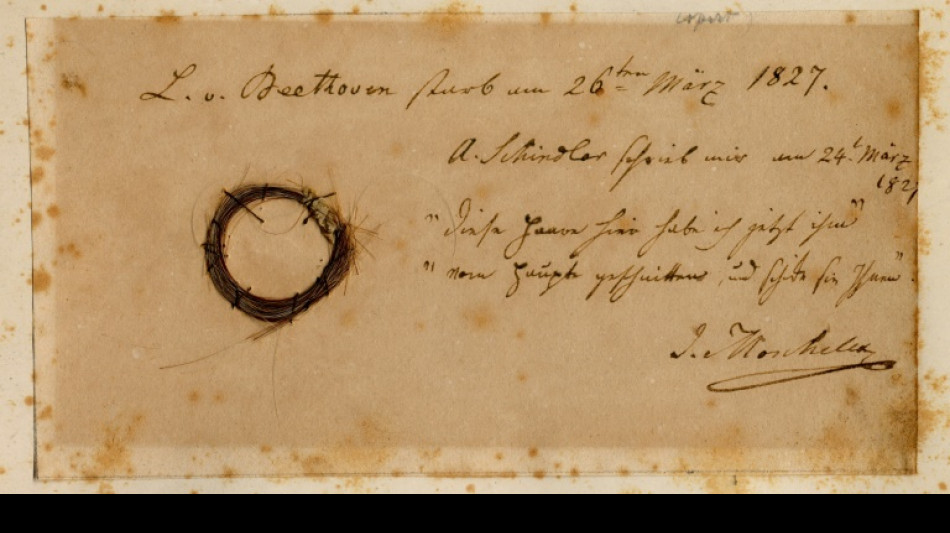
-
 Thailand says Cambodia agrees to border talks after ASEAN meet
Thailand says Cambodia agrees to border talks after ASEAN meet
-
Alleged Bondi shooters conducted 'tactical' training in countryside, Australian police say

-
 Swiss court to hear landmark climate case against cement giant
Swiss court to hear landmark climate case against cement giant
-
Knicks' Brunson scores 47, Bulls edge Hawks epic

-
 Global nuclear arms control under pressure in 2026
Global nuclear arms control under pressure in 2026
-
Asian markets rally with Wall St as rate hopes rise, AI fears ease

-
 Jailed Malaysian ex-PM Najib loses bid for house arrest
Jailed Malaysian ex-PM Najib loses bid for house arrest
-
Banned film exposes Hong Kong's censorship trend, director says

-
 Duffy, Patel force West Indies collapse as NZ close in on Test series win
Duffy, Patel force West Indies collapse as NZ close in on Test series win
-
Australian state pushes tough gun laws, 'terror symbols' ban after shooting

-
 A night out on the town during Nigeria's 'Detty December'
A night out on the town during Nigeria's 'Detty December'
-
US in 'pursuit' of third oil tanker in Caribbean: official

-
 CO2 soon to be buried under North Sea oil platform
CO2 soon to be buried under North Sea oil platform
-
Steelers edge Lions as Bears, 49ers reach playoffs

-
 India's Bollywood counts costs as star fees squeeze profits
India's Bollywood counts costs as star fees squeeze profits
-
McCullum admits errors in Ashes preparations as England look to salvage pride

-
 Pets, pedis and peppermints: When the diva is a donkey
Pets, pedis and peppermints: When the diva is a donkey
-
'A den of bandits': Rwanda closes thousands of evangelical churches

-
 Southeast Asia bloc meets to press Thailand, Cambodia on truce
Southeast Asia bloc meets to press Thailand, Cambodia on truce
-
As US battles China on AI, some companies choose Chinese

-
 AI resurrections of dead celebrities amuse and rankle
AI resurrections of dead celebrities amuse and rankle
-
Heirs Energies Agrees $750m Afreximbank Financing to Drive Long-Term Growth

-
 Black Book Poll: "Governed AI" Emerges as the Deciding Factor in 2026 NHS Procurement
Black Book Poll: "Governed AI" Emerges as the Deciding Factor in 2026 NHS Procurement
-
Hemogenyx Pharmaceuticals PLC Announces Update on Admission of Shares

-
 Pantheon Resources PLC Announces Shareholder Letter and Corporate Update on Dubhe-1
Pantheon Resources PLC Announces Shareholder Letter and Corporate Update on Dubhe-1
-
Tocvan Begins Trenching Material for the Pilot Mine and Pushes Ahead With Infrastructure Development

-
 Steelers receiver Metcalf strikes Lions fan
Steelers receiver Metcalf strikes Lions fan
-
Morocco coach 'taking no risks' with Hakimi fitness

-
 Gang members given hundreds-years-long sentences in El Salvador
Gang members given hundreds-years-long sentences in El Salvador
-
Chargers, Bills edge closer to playoff berths

-
 Gang members given hundred-years-long sentences in El Salvador
Gang members given hundred-years-long sentences in El Salvador
-
Hosts Morocco off to winning start at Africa Cup of Nations

-
 No jacket required for Emery as Villa dream of title glory
No jacket required for Emery as Villa dream of title glory
-
Amorim fears United captain Fernandes will be out 'a while'

-
 Nigerian government frees 130 kidnapped Catholic schoolchildren
Nigerian government frees 130 kidnapped Catholic schoolchildren
-
Captain Kane helps undermanned Bayern go nine clear in Bundesliga

-
 Captain Kane helps undermanned Bayern go nine clear
Captain Kane helps undermanned Bayern go nine clear
-
Rogers stars as Villa beat Man Utd to boost title bid

-
 Barca strengthen Liga lead at Villarreal, Atletico go third
Barca strengthen Liga lead at Villarreal, Atletico go third
-
Third 'Avatar' film soars to top in N. American box office debut

-
 Third day of Ukraine settlement talks to begin in Miami
Third day of Ukraine settlement talks to begin in Miami
-
Barcelona's Raphinha, Yamal strike in Villarreal win

-
 Macron, on UAE visit, announces new French aircraft carrier
Macron, on UAE visit, announces new French aircraft carrier
-
Barca's Raphinha, Yamal strike in Villarreal win

-
 Gunmen kill 9, wound 10 in South Africa bar attack
Gunmen kill 9, wound 10 in South Africa bar attack
-
Allegations of new cover-up over Epstein files

-
 Atletico go third with comfortable win at Girona
Atletico go third with comfortable win at Girona
-
Schwarz breaks World Cup duck with Alta Badia giant slalom victory

-
 Salah unaffected by Liverpool turmoil ahead of AFCON opener - Egypt coach
Salah unaffected by Liverpool turmoil ahead of AFCON opener - Egypt coach
-
Goggia eases her pain with World Cup super-G win as Vonn takes third


DNA analysis of Beethoven's hair provides clues to his death
Ludwig van Beethoven died in Vienna nearly 200 years ago after a lifetime of composing some of the most influential works in classical music.
Ever since, biographers have sought to explain the causes of the German composer's death at the age of 56, his progressive hearing loss and his well-documented struggles with chronic illness.
A team of researchers who sequenced Beethoven's genome using locks of the German composer's hair may now have some answers.
Liver failure, or cirrhosis, was the likely cause of Beethoven's death brought about by a number of factors, including his alcohol consumption, they said.
"We looked at possible genetic causes of his three main symptom complexes -- the progressive hearing loss, the gastrointestinal symptoms and the liver disease ultimately leading to his death due to liver failure," said Markus Nothen of the Institute of Human Genetics at the University Hospital of Bonn, one of the co-authors.
Beethoven, Nothen said, had "a strong genetic disposition to liver disease" and sequences of the hepatitis B virus were detected in his hair.
"We believe the disease arose from an interplay of genetic disposition, well documented chronic alcohol consumption and hepatitis B infection," Nothen said.
Johannes Krause of the Max Planck Institute for Evolutionary Anthropology said hepatitis B "was probably quite common at that time in the early 19th century."
"At least in the last few months before his death he was infected with hepatitis B virus," Krause said.
The authors of the study, published in the Cell Press journal Current Biology on Wednesday, were unable to determine the cause of the hearing loss that eventually left Beethoven profoundly deaf.
The researchers analyzed eight locks of hair said to be from Beethoven and determined that five of them were "almost certainly authentic," said Tristan Begg, a PhD student at the University of Cambridge and the lead author of the study.
"Because we reconstructed the genome from ultra-short DNA fragments, we only confidently mapped about two-thirds of it," he said.
- 'Acute illness' -
Beethoven, who was born in Bonn in 1770 and died in 1827, battled gastrointestinal problems at various times of his life as well as jaundice.
"There were periods of acute illness where he was unable to work, for example, his month-long period of acute illness in the spring of 1825," Begg said.
The researchers, by studying Beethoven's DNA data and archival documents, also uncovered a discrepancy in his legal and biological genealogy.
They found an "extra-pair paternity event" -- a child resulting from an extramarital relationship -- in Beethoven's direct paternal line, said Toomas Kivisild of the Institute of Genomics at the University of Tartu.
Kivisild said it occurred some time within seven generations that separate a common ancestor, Aert van Beethoven, at the end of the 16th century and Beethoven's birth in 1770.
Begg said it was no surprise it was not recorded.
"You wouldn't necessarily expect an extra-pair paternity event to be documented," he said, being "probably clandestine in nature."
"You cannot rule out that Beethoven himself may have been illegitimate," Begg said.
"I'm not advocating that," he stressed. "I'm simply saying that's a possibility and you have to consider it."
Beethoven had asked in an 1802 letter that his health problems, particularly his hearing loss, be described after his death.
"He had the wish to be studied post-mortem," Krause said.
"And it is kind of, basically, his wish that we are fulfilling to some degree with this project."
P.Stevenson--AMWN



